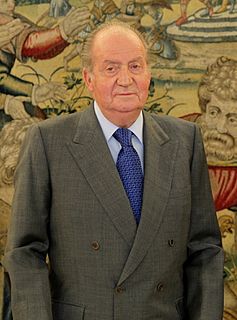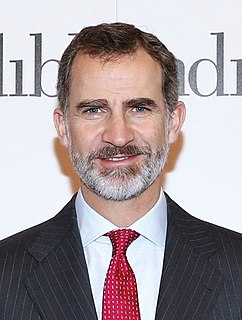
Andalusia is the southern autonomous community in Peninsular Spain. It is the most populous, and the second largest autonomous community in the country. The Andalusian autonomous community is officially recognised as a "historical nationality". The territory is divided into eight provinces: Almería, Cádiz, Córdoba, Granada, Huelva, Jaén, Málaga and Seville. Its capital is the city of Seville. The seat of the High Court of Justice of Andalusia is located in the city of Granada.

Colombia, officially the Republic of Colombia, is a transcontinental country largely in the north of South America, with territories in North America. Colombia is bounded on the north by the Caribbean Sea, the northwest by Panama, the south by Ecuador and Peru, the east by Venezuela, the southeast by Brazil, and the west by the Pacific Ocean. It comprises 32 departments and the Capital District of Bogotá, the country's largest city.

The Canary Islands, also known informally as the Canaries, are a Spanish archipelago and the southernmost autonomous community of Spain located in the Atlantic Ocean, in a region known as Macaronesia, 100 kilometres west of Morocco at the closest point.

Catalonia is an autonomous community on the northeastern corner of Spain, designated as a nationality by its Statute of Autonomy.

Francisco Franco Bahamonde was a Spanish general who led the Nationalist forces in overthrowing the Second Spanish Republic during the Spanish Civil War and thereafter ruled over Spain from 1939 to 1975 as a dictator, assuming the title Caudillo. This period in Spanish history, from the Nationalist victory to Franco's death, is commonly known as Francoist Spain or the Francoist dictatorship.

Puerto Rico, officially the Commonwealth of Puerto Rico and from 1898 to 1932 also called Porto Rico in English, is an unincorporated territory of the United States located in the northeast Caribbean Sea, approximately 1,000 miles (1,600 km) southeast of Miami, Florida.

Spain, officially the Kingdom of Spain, is a country in Southwestern Europe with some pockets of territory across the Strait of Gibraltar and the Atlantic Ocean. Its continental European territory is situated on the Iberian Peninsula. Its territory also includes two archipelagos: the Canary Islands off the coast of North Africa, and the Balearic Islands in the Mediterranean Sea. The African enclaves of Ceuta, Melilla, and Peñón de Vélez de la Gomera make Spain the only European country to have a physical border with an African country (Morocco). Several small islands in the Alboran Sea are also part of Spanish territory. The country's mainland is bordered to the south and east by the Mediterranean Sea; to the north and northeast by France, Andorra, and the Bay of Biscay; and to the west and northwest by Portugal and the Atlantic Ocean respectively.

Spanish or Castilian is a Romance language that originated in the Iberian Peninsula of Europe; today, it is a global language with nearly 500 million native speakers, mainly in Spain and the Americas. It is the world's second-most spoken native language, after Mandarin Chinese, and the world's fourth-most spoken language, after English, Mandarin Chinese and Hindi.

The Campeonato Nacional de Liga de Primera División, commonly known as La Liga, is the men's top professional football division of the Spanish football league system. Administered by the Liga Nacional de Fútbol Profesional, is contested by 20 teams, with the three lowest-placed teams at the end of each season relegated to the Segunda División and replaced by the top two teams and a play-off winner in that division.

Philip II was King of Spain (1556–1598), King of Portugal, King of Naples and Sicily, and jure uxoris King of England and Ireland. He was also Duke of Milan from 1540. From 1555 he was Lord of the Seventeen Provinces of the Netherlands.

Juan Carlos I is a member of the Spanish royal family who reigned as King of Spain from November 1975 until his abdication in June 2014. In Spain, since his abdication, Juan Carlos has usually been referred to as the Rey Emérito.

Felipe VI or Philip VI is the King of Spain. He ascended the throne on 19 June 2014 upon the abdication of his father, Juan Carlos I. His mother is Queen Sofía, and he has two elder sisters, Infanta Elena, Duchess of Lugo, and Infanta Cristina. In 2004, Felipe married TV news journalist Letizia Ortiz with whom he has two daughters, Leonor and Sofía.

Buenos Aires, officially Autonomous City of Buenos Aires, is the capital and largest city of Argentina. The city is located on the western shore of the estuary of the Río de la Plata, on the South American continent's southeastern coast. "Buenos Aires" can be translated as "fair winds" or "good airs", but the former was the meaning intended by the founders in the 16th century, by the use of the original name "Real de Nuestra Señora Santa María del Buen Ayre", named after the Madonna of Bonaria in Sardinia. The Greater Buenos Aires conurbation, which also includes several Buenos Aires Province districts, constitutes the fifth-most populous metropolitan area in the Americas, with a population of around 15.6 million.

The Spanish Empire, historically known as the Hispanic Monarchy and as the Catholic Monarchy, was one of the largest empires in history. From the late 15th century to the early 19th, Spain controlled a huge overseas territory in the New World, the Asian archipelago of the Philippines, what they called "The Indies" and territories in Europe, Africa and Oceania. It was one of the most powerful empires of the 16th and 17th centuries. The Spanish Empire became known as "the empire on which the sun never sets" and reached its maximum extent in the 18th century.

Club de Gimnasia y Esgrima La Plata, also known simply as Gimnasia, is a professional Argentine sports club based in the city of La Plata, Buenos Aires Province. Founded in 1887 as "Club de Gimnasia y Esgrima", the club is mostly known for its football team, which currently plays in Primera División, the first division of the Argentine football league system. The club was most famously managed by football legend Diego Maradona from 2019 until his death in November 2020.

Mexico, officially the United Mexican States, is a country in the southern portion of North America. It is bordered to the north by the United States; to the south and west by the Pacific Ocean; to the southeast by Guatemala, Belize, and the Caribbean Sea; and to the east by the Gulf of Mexico. Mexico covers 1,972,550 square kilometers (761,610 sq mi) and has approximately 128,649,565 inhabitants, making it the world's 13th-largest country by area, 10th-most-populous country, and most populous Spanish-speaking nation. It is a federation comprising 31 states and Mexico City, its capital city and largest metropolis. Other major urban areas include Guadalajara, Monterrey, Puebla, Toluca, Tijuana, Ciudad Juárez, and León.

The Spanish Civil War was a civil war in Spain fought from 1936 to 1939. Republicans loyal to the left-leaning Popular Front government of the Second Spanish Republic, in alliance with anarchists, of the communist and syndicalist variety, fought against a revolt by the Nationalists, an alliance of Falangists, monarchists, conservatives and traditionalists, led by a military group among whom General Francisco Franco soon achieved a preponderant role. Due to the international political climate at the time, the war had many facets and was variously viewed as class struggle, a war of religion, a struggle between dictatorship and republican democracy, between revolution and counterrevolution, and between fascism and communism. According to Claude Bowers, U.S. ambassador to Spain during the war, it was the "dress rehearsal" for World War II. The Nationalists won the war, which ended in early 1939, and ruled Spain until Franco's death in November 1975.

Argentina, officially the Argentine Republic, is a country located mostly in the southern half of South America. Sharing the bulk of the Southern Cone with Chile to the west, the country is also bordered by Bolivia and Paraguay to the north, Brazil to the northeast, Uruguay and the South Atlantic Ocean to the east, and the Drake Passage to the south. With a mainland area of 2,780,400 km2 (1,073,500 sq mi), Argentina is the eighth-largest country in the world, the fourth largest in the Americas, the second largest in South America after Brazil, and the largest Spanish-speaking nation by area. The sovereign state is subdivided into twenty-three provinces and one autonomous city, Buenos Aires, which is the federal capital of the nation as decided by Congress. The provinces and the capital have their own constitutions, but exist under a federal system. Argentina claims sovereignty over part of Antarctica, the Falkland Islands, and South Georgia and the South Sandwich Islands.

The Spanish colonial period in the Philippines was the period during which the Philippines were part of the Spanish Empire as the Captaincy General of the Philippines from 1565 to 1898. The islands were part of the larger Spanish East Indies. Forty-four years after Ferdinand Magellan landed in the Philippines and died in the Battle of Mactan in 1521, the Spanish explored and colonialized the islands, starting with the founding of Cebu by Miguel Lopez de Legazpi in 1565. Manila was made the capital of the Philippines in 1571. This was the time of the reign of King Philip II of Spain, whose name has remained attached to the country. The Spanish colonial period ended with the Philippine Revolution and Spanish-American War in 1898, which marked the beginning of the American colonialization of the Philippines.

Madrid is the capital and most-populous city of Spain. The city has almost 3.3 million inhabitants and a metropolitan area population of approximately 6.5 million. It is the second-largest city in the European Union (EU), surpassed only by Berlin, and its monocentric metropolitan area is the second-largest in the EU, surpassed only by Paris. The municipality covers 604.3 km2 (233.3 sq mi).





















